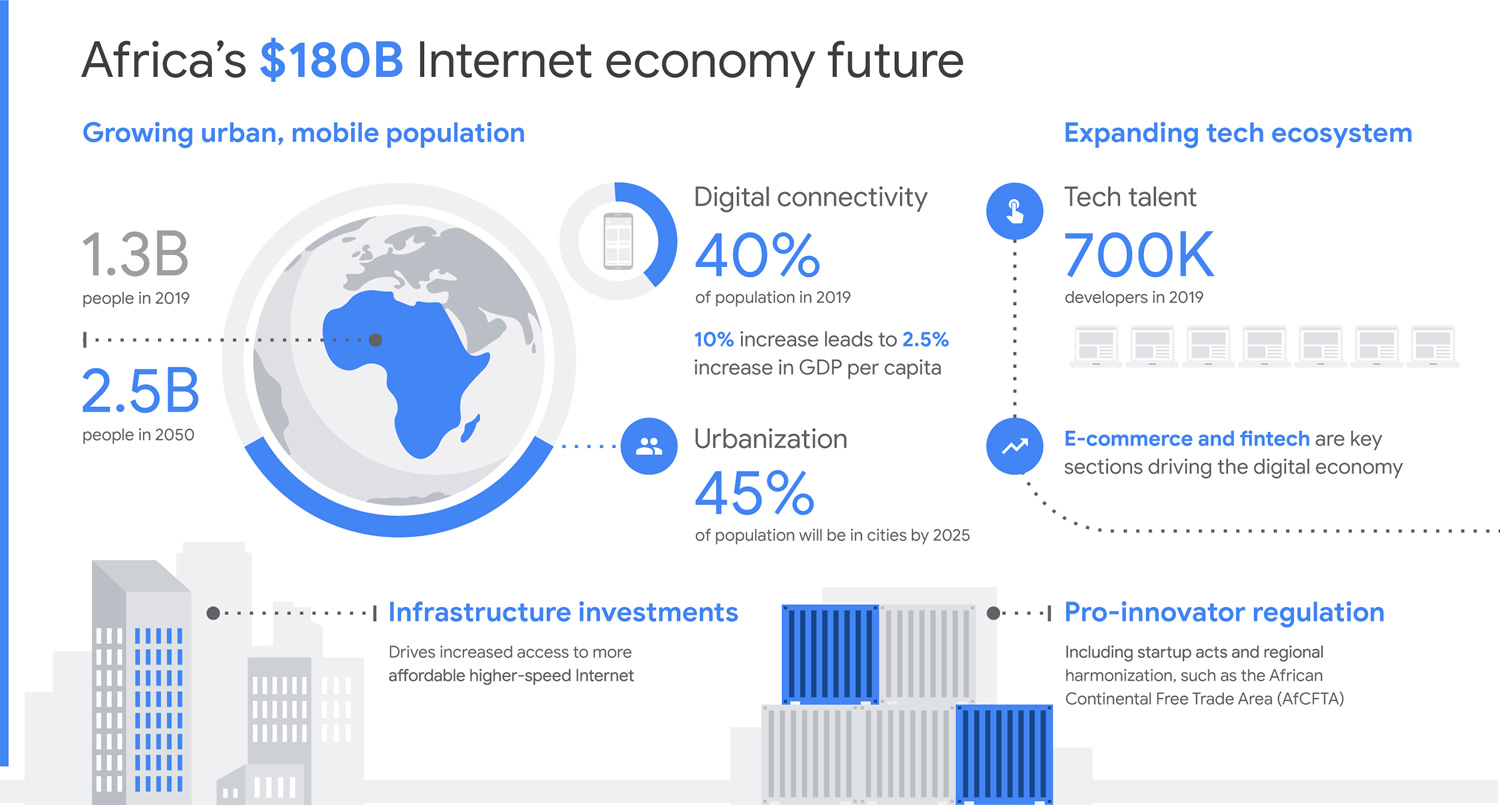E-Government Development in Africa
Digital government has reached a critical point. It is an integral aspect of the physical functioning of public institutions and services delivery. It is imperative that digital government, including e-services and e-participation, be designed in a way that strengthens trust in Governments and public institutions.
Several African countries have improved their telecommunications infrastructure, however e-government development efforts require the cost of mobile broadband to come down. The acceleration of digitalization in the private sector has raised people’s expectations for more effective public services delivery. African governments are now having to be more innovative, resourceful, and effective and to contribute proactively to the digital transformation.
Digitalization trends in Africa are positive overall. Fixed broadband subscriptions have jumped 48 per cent since 2020, rising from 1.80 to 2.67 per 100 inhabitants. Survey results for 2022 indicate that 33 per cent of the region’s residents use the Internet, 42.8 per cent are active mobile broadband subscribers, and 83.7 per cent have mobile cellular telephone subscriptions [source: ITU].
Africa’s rapidly growing urban and mobile populations now represent a $180 billion internet economy:

Source: International Finance Corporation/Google, e-Conomy Africa 2022
Information and communications technology (ICT) has played a key role in promoting innovation in governance, supporting the development of e-government and serving the broader goals of sustainable development. The United Nations annual E-Government Surveys produce an annual EGDI (E-Government Development Index). The global average EGDI is 0.6102. Although the African average EGDI is lower (0.4054), several countries are moving above the global average and more are moving from the middle to high EGDI group, according to UN rankings.
South Africa has become the regional front-runner in e-government development, with an EGDI value of 0.7357 Although the EGDI values for Rwanda, Côte d’Ivoire and Zambia remain below the global average, these three countries moved from the middle to the high EGDI group for the first time in 2022. Among the 16 countries in the high EGDI group in Africa, 14 are upper-middle-income or lower-middle income countries.
|
Country |
EGDI Group |
EGDI 2022 |
|
Angola |
Middle EGDI |
0.3789 |
|
Benin |
Middle EGDI |
0.4264 |
|
Botswana |
High EGDI |
0.5495 |
|
Burkina Faso |
Middle EGDI |
0.3476 |
|
Cameroon |
Middle EGDI |
0.4498 |
|
Cote d’Ivoire |
High EGDI |
0.5467 |
|
DRC |
Middle EGDI |
0.3057 |
|
Egypt |
High EGDI |
0.5895 |
|
Ethiopia |
Middle EGDI |
0.2865 |
|
Gambia |
Middle EGDI |
0.3088 |
|
Ghana |
High EGDI |
0.5824 |
|
Kenya |
High EGDI |
0.5589 |
|
Lesotho |
Middle EGDI |
0.4414 |
|
Liberia |
Middle EGDI |
0.2905 |
|
Madagascar |
Middle EGDI |
0.3565 |
|
Malawi |
Middle EGDI |
0.3435 |
|
Mauritius |
High EGDI |
0.7201 |
|
Mozambique |
Middle EGDI |
0.3130 |
|
Namibia |
High EGDI |
0.5322 |
|
Niger |
Low EGDI |
0.2406 |
|
Nigeria |
Middle EGDI |
0.4525 |
|
Republic of the Congo |
Middle EGDI |
0.3675 |
|
Rwanda |
High EGDI |
0.5489 |
|
Senegal |
Middle EGDI |
0.4479 |
|
Seychelles |
High EGDI |
0.6793 |
|
Sierra Leone |
Middle EGDI |
0.2633 |
|
South Africa |
High EGDI |
0.7457 |
|
Togo |
Middle EGDI |
0.4231 |
|
Uganda |
Middle EGDI |
0.4424 |
|
Zambia |
High EGDI |
0.5022 |
|
Zimbabwe |
Middle EGDI |
0.4717 |
Source: United Nations E-Government Survey 2022
South Africa, Mauritius and Seychelles are respectively ranked first through third in the African region in e-government development, and Rwanda has seen significant improvement in its ranking, moving up by more than 10 positions. In South Africa, the National Development Plan: Vision for 2030 includes the National E-Government Strategy and Roadmap. In Mauritius, the Digital Government Transformation Strategy contains specific recommendations for government agencies on how to activate the SDGs. The Ministry of Information Technology, Communication and Innovation has worked together with the business community to align the Digital Government Transformation Strategy with the Public Sector Business Transformation Strategy. In Seychelles, the Government has been working with telecommunications services to extend Internet accessibility to more segments of the population. The success enjoyed by Rwanda in e-government development derives from a long-term vision that was initiated in 2000 and realized in 2020 with the SMART Rwanda Master Plan.
Engaging With The Private Sector – Advantage Africa
The private sector has been at the forefront of the digital transformation for several years. The private sector has raised the bar on the customer experience, and the public sector is expected to keep up.
Budget issues constitute a challenge for all countries; African countries must decide how to address development priorities with limited resources, and developed countries are locked into spending billions of dollars to maintain massive but largely obsolete “legacy systems”. For example, the US Government still spends 70 per cent of its $100 billion IT budget to support legacy systems, some of dating back to the 1970s.
This represents an advantage to many African countries which simply do not have the legacy systems that eat into public sector budget for digitisation. We are now seeing African countries embrace a culture of innovation, breaking down silos and improving collaboration between departments.
For optimal digital integration and development, African governments are looking to work with those private enterprises that can demonstrate the benefits of comprehensive digital integration.


